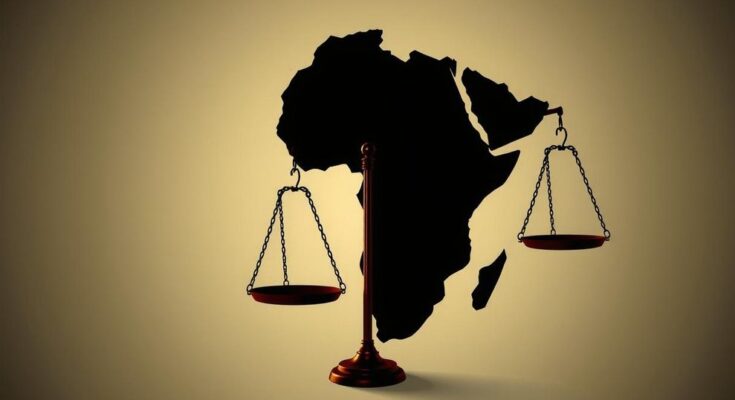The DRC has requested UN sanctions against Rwanda, accusing it of deploying troops and supporting the M23 militia in a declaration of war. This escalation threatens Goma, where civilians are fleeing amidst violence. The UN has urged Rwanda to withdraw its forces, while both countries have withdrawn diplomats, reflecting the severe breakdown in relations. The situation underscores the ongoing conflict in the region, with significant implications for peace and security.
The Democratic Republic of Congo (DRC) has appealed to the United Nations to enforce sanctions against Rwanda for allegedly declaring war by dispatching additional troops across the border. The DRC accused Rwanda of reinforcing the M23 militia, which has been advancing towards Goma, North Kivu’s capital. Following recent clashes, which have resulted in peacekeeper casualties, UN Secretary-General António Guterres has urged the removal of Rwandan forces from DRC territory.
In an emergency UN Security Council meeting, the DRC’s Foreign Minister, Thérèse Kayikwamba Wagner, described the troop deployments as a blatant violation of sovereignty, constituting a “declaration of war.” Reports indicated that between 500 and 1,000 Rwandan troops crossed into DRC, further escalating tensions in the region. Kayikwamba has called for targeted sanctions, emphasizing that the UN can impose necessary consequences on Rwandan officials.
Dipomatic relations between the DRC and Rwanda have been severed, with both countries withdrawing their diplomats due to escalating hostilities. The M23 has rapidly advanced towards Goma following the cancellation of peace talks between President Paul Kagame of Rwanda and President Félix Tshisekedi of the DRC. As the fighting intensified, numerous civilians have fled Goma, and a Rwandan drone attack targeted DRC forces north of the city.
Amid growing international condemnation of Rwanda’s actions, both the African Union and the United States have called for an immediate ceasefire. UN Secretary-General Guterres urged the M23 to halt all aggressive actions and for Rwanda to cease its support for the insurgency. This escalation has drawn attention to previous violations of UN resolutions in the ongoing conflict.
Historically, Rwanda has been linked to the M23 to secure access to DRC’s mineral resources. In light of this, Kayikwamba has requested a total ban on the export of minerals labeled as Rwandan, particularly gold. Recently, DRC announced the withdrawal of its diplomats from Rwanda, prompting a similar action from Kigali, stirring tensions further.
Previously, Goma faced an occupation by the M23 in 2012, which ended in a temporary deal. However, the group regrouped after military defeats and has since been involved in multiple ceasefires, all of which have collapsed. The ongoing conflict has seen over 15,000 UN peacekeepers deployed in the region, with recent clashes resulting in the deaths of 13 soldiers from various nationalities, including South African and Malawian forces. Non-essential UN staff are now being evacuated as violence escalates.
The current tensions between the DRC and Rwanda stem from a longstanding history of conflict in the region, which has been characterized by the influence of armed groups like the M23. This group has allegedly received support from Rwanda in its efforts to seize control of strategic territories, particularly in the mineral-rich eastern DRC. The international community, disturbed by the implications of foreign military involvement, is increasingly calling for accountability and intervention to restore peace.
The situation in eastern DRC is deteriorating rapidly, as evidenced by Rwanda’s increased military presence and the DRC’s call for UN sanctions. The conflict not only poses a significant humanitarian crisis but also undermines regional stability. Continued international pressure is essential to halt hostilities and to negotiate a sustainable resolution that addresses underlying grievances and ensures the security of civilians.
Original Source: www.wyomingnewsnow.tv




